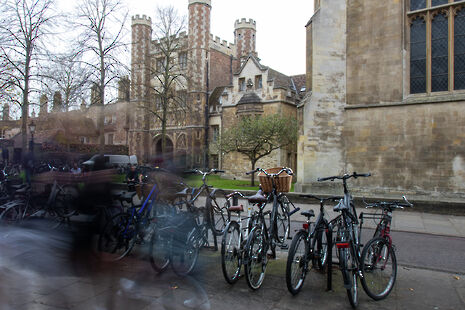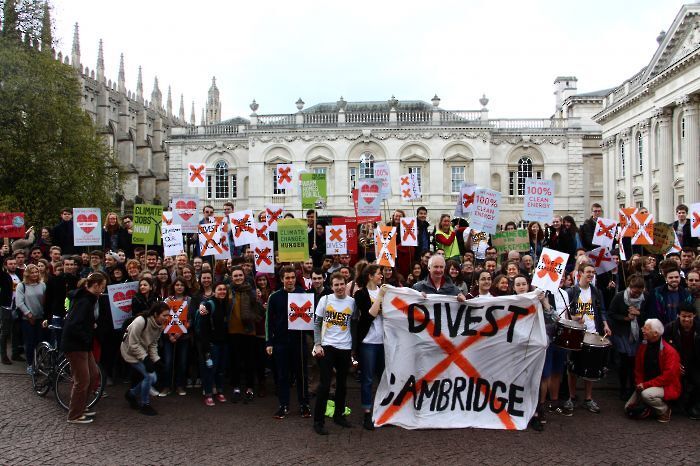University and colleges avoided tax through offshore fossil fuel investment
Analysis of the Paradise Papers shows that Oxford and Cambridge invested tens of millions in offshore funds

The universities of Oxford and Cambridge, and several of their constituent colleges, have invested millions of pounds in tax havens, according to documents released through the Paradise Papers leak.
Analysis of files from two offshore service providers by The Guardian and 95 other news outlets show that a fund into which both universities paid had invested money into a company dealing in oil exploration and deep-sea drilling.
According to the documents, Cambridge invested $1.7m (£1.3m) in Coller International, a private equity firm based in Guernsey, as did a number of individual colleges. Money invested from Oxford in the same firm totalled $3.4m (£2.6m).
The money invested in the firm was split between two funds, one of which – Coller International Partners V – became the largest of its kind worldwide, attracting a total of $4.8bn from investors across the world.
The biggest investment made by the fund was received by Royal Dutch Shell, an Anglo-Dutch oil and gas company. Other Shell partners that benefitted from the fund include Xtreme Coil and the Shell Technology Ventures Fund, both of which are involved in oil exploration and production.
The majority of colleges linked to offshore investments did so through the Coller funds. Colleges who invested in this manner include Clare, Downing, Gonville & Caius, Jesus, Murray Edwards, Newnham, Pembroke, St Catharine’s, St John’s and Trinity Hall. However, several colleges made investments in their own right, including Trinity College, the richest in Cambridge. Trinity’s investments totalled $13m (£10m).
According to The Guardian, the documents also reveal information about investments made by both universities in multi-billion dollar private equity partnerships based in the Cayman Islands, a well-known tax haven.
An endowment fund attached to the University, the Gates Cambridge Trust, individually invested $4.5m (£3.4m) in private equity firm Dover Street. The firm is one of a group of corporations known as ‘blockers’, which enable investors to avoid US taxes on cash put into hedge funds.
The revelations have sparked anger on the part of those campaigning for the University to divest from fossil fuels. As a result of growing unease among University members about where the University invests its cash, the University established a working group tasked with evaluating the “advantages and disadvantages” of divesting from fossil fuels. The second of its kind, the working group will reportedly “consider the question of disinvestment from such businesses more broadly” than its predecessor. The group has recently held a series of two town hall meetings, designed as a means of gathering the opinions of University members on the issue.
In a statement released on its Facebook page, Cambridge Zero Carbon Society, a divestment campaign group, said: “These revelations are absolutely scandalous. That the University has been investing tens of millions of pounds in offshore funds to dodge tax is bad enough. That in doing so it has been investing huge quantities in Shell’s deep-sea oil exploits is outrageous.”
The statement called on the University to apologise for its past investment decisions, and vow that it would not invest in either offshore funds or deep-sea drilling companies in the future. It also demanded the resignation of the University’s Chief Investment Officer Nick Cavalla.
A spokesperson said on behalf of the colleges and University: “The Colleges and the University are charities and therefore their holdings in investments are tax-exempt in the UK, US and many other countries. This means there is normally no tax to pay.
“The fund arrangement, through which the University and Colleges invest, is standard for collective investments of this type. The fund is managed by a highly reputable investment advisor and, as is normal, the adviser makes the decisions about specific investments to be made by the fund.
“A divestment working group was set up by University council in May 2017 to consider the question of divestment from businesses involved in fossil fuel industries. The University is currently seeking views from a wide range of organisations and individuals. In addition to written submissions we are holding town hall meetings open to staff and students from across the University”.
A spokesman for Oxford University defended the institution's investments on similar grounds, telling The Independent: "As charitable trusts, Oxford University’s endowment is exempt from UK tax. The taxpayer therefore does not lose a penny from our investments.
"The investments generate some £80 million a year which is spent on key academic priorities in Oxford. These include the majority of our scholarships and bursaries for students, vital research across medicine, the sciences, social sciences and humanities and our globally outstanding teaching.
"That is £80m for UK education and research which the taxpayer does not have to fund."
 News / Judge Business School advisor resigns over Epstein and Andrew links18 February 2026
News / Judge Business School advisor resigns over Epstein and Andrew links18 February 2026 News / Gov grants £36m to Cambridge supercomputer17 February 2026
News / Gov grants £36m to Cambridge supercomputer17 February 2026 News / Hundreds of Cambridge academics demand vote on fate of vet course20 February 2026
News / Hundreds of Cambridge academics demand vote on fate of vet course20 February 2026 News / CUCA members attend Reform rally in London20 February 2026
News / CUCA members attend Reform rally in London20 February 2026 News / Union speakers condemn ‘hateful’ Katie Hopkins speech14 February 2026
News / Union speakers condemn ‘hateful’ Katie Hopkins speech14 February 2026










